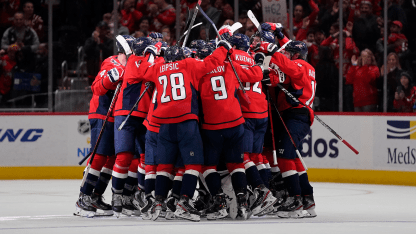The Capitals lead the NHL in comebacks from deficits of two or more goals this season, but few - if any - were more impressive or historic than Sunday's improbable 5-4 overtime win over the San Jose Sharks in the opener of the Caps' two-game homestand.
How Rare was Caps' Sunday Comeback?
Caps gave up a hat trick, two power-play goals and an empty-netter in 5-4 win over Sharks on Sunday

By
Mike Vogel
WashingtonCaps.com
With exactly a minute left in regulation, San Jose's Logan Couture potted an empty-net goal, putting the Sharks up 4-2. It looked like it was over, but it wasn't. The Caps struck twice at 6-on-5 in the final minute, forcing overtime. Two excellent Braden Holtby saves and a Lars Eller goal later, the stunned Sharks were off to St. Louis for a Tuesday date with the defending champs.
Monday was an off day for the Capitals, and their historic comeback was still a topic of conversation in the room at MedStar Capitals Iceplex after Tuesday's morning skate ahead of Tuesday night's tilt with Ottawa.
"That's a pretty interesting one," says Caps defenseman John Carlson. "I don't know, I think the rally in Vancouver [on Oct. 25] was a little bit greater for me. Obviously, I don't know the specifics on likelihood of either, but it just felt like it took longer, it took more for us to give to come back from four [goals down] versus having a heck of a minute and a half or whatever it was [on Sunday].
"I like them both, but I think in terms of pulling together great examples of [our comeback ability], for me Vancouver was a big one."
The Vancouver rally to which Carlson refers was a 6-5 Washington win over the Canucks, a game in which the Caps trailed 5-1 as the final seconds of the second period ticked away. That's when Evgeny Kuznetsov sparked the comeback with a goal to make it a 5-2 game with less than a second remaining in the middle period. Eller scored a shorty early in the third, and then Michal Kempny scored twice - on consecutive shifts - to tie the game, which eventually Washington won 6-5 in the shootout.
WSH@VAN: Capitals stage late rally for shootout win
That comeback against the Canucks is one of only five the Caps have managed from four-goal deficits over their 46-year history, and the most recent previous example came on Dec. 23, 2008 when they rallied from a 4-0 ditch to down the Rangers in New York, winning 5-4 on Shaone Morrisonn's goal in overtime.
As for Sunday's win over the Sharks, in which the Caps erased a two-goal deficit in the final minute to win 5-4 overtime, and in which they did so after allowing an empty-net goal, it's a rarer occurrence. In fact, looked at under a certain light, it's never happened previously in league history, as far as anyone can determine.
In the aftermath of Sunday's wild win, my first thought was: How often does a team win a game in which it allows an empty-net goal? Caps manager of media relations Tommy Chalk wrote to the NHL's amazing statistical research team to find out. The response came later on Sunday afternoon, and as it turns out, Sunday's game was the sixth instance in NHL history of a team yielding an empty-net goal and going on to win the game. It happened just a few years back, on Oct. 15, 2016 when Vancouver edged Calgary in a shootout, 2-1.
But wait. Why would there be an empty-net goal in a 2-1 game, which was effectively a 1-1 game, since it was decided in a shootout? Because the empty-net goal here was scored in the first period, credited to the Flames' Troy Brouwer when the Canucks pulled their netminder on a delayed penalty and inadvertently put the puck in their own net. Tommy looked up as many of the previous occurrences as he could, and he found they all involved an empty-netter resulting from a delayed penalty.
All this left us wondering whether the Caps might be the first team ever to allow an empty-netter and to comeback from a two-goal deficit in the game's final minute to win. Tommy wrote another email:
\\\
I looked up the game sheets from the below games, and for the most recent games where this occurred (the one in 2016 and the two in 2014), the empty net goals were scored when the eventual game winner pulled their goalie during a delayed penalty, and an own goal was scored, which obviously wasn't the same scenario in the Capitals' win yesterday. I wasn't able to look up game sheets from the games that occurred in 1970 and 1979, but based on the below scores of the games, I believe the same delayed penalty scenario occurred in those games. Can you confirm that the empty net goals were scored during a delayed penalty during those two games from the 70s and that the three from the 2010s were scored on delayed penalties?
Additionally, if this is possible, what is the overall record in NHL history in instances where a team is down by two or more goals and they pull their goaltender at some point during the final minute? My belief is this may be the first instance in NHL history this has occurred, and that there have been 100s of scenarios where a goaltender was pulled down by two or more goals.
\\\
Another great thing about the stats crew is they're always quick to respond. Later on Monday came the reply:
\\\
Thanks for bringing this to our attention. Based on these instances, in which a team that allowed an empty-net goal won the game, it does appear that the Capitals are the first team to allow an empty-net goal in the final minute while trying to win the game and go on to win in any fashion.
In the April 5, 1970 game, the Rangers beat the Red Wings 9-5 and did allow two empty-net, shorthanded goals. This was a unique circumstance as the Rangers and Canadiens finished the regular season with identical records but the Rangers made the playoffs on the basis of more goals scored. The Rangers pulled goaltender Eddie Giacomin with 3:47 to play in the third period (they were on the power play as the Red Wings had taken a penalty at 16:02) in an effort to score more goals and make their differential wider against the Canadiens but they ended up allowing two into an empty net. On a historical note, this marked the first time in NHL history a team had made it into playoffs on the basis of goals scored.
In the Islanders-Rockies game from Nov. 28, 1979, Billy Smith was credited with being the first NHL goaltender to score a goal after being the last player to touch the puck before Rockies defenseman Rob Ramage shot it the length of the ice into his own net on a delayed penalty.
We have confirmed the three more recent instances all involved delayed-penalty own goals.
We are working to determine team records when down by two goals and pulling their goaltender in the final minute and will get back to you when we have something.
\\\
Earlier this season, on Nov. 23, the Bruins rallied with two late 6-on-5 goals from David Krecji to tie the Minnesota Wild and force overtime, where Boston won on a Torey Krug goal. In the aftermath of that event, the same statistical research crew noted that Boston "became the 29th team in NHL history to overcome a multi-goal deficit in the last two minutes of a game and win in any fashion." (emphasis, theirs)
Note the "last two minutes of a game" distinction here; Washington's two 6-on-5 goals were both in the final minute. On Monday night came a further response came from the league's stats team:
\\\
Unfortunately, we do not have a historical record of teams pulling their goaltender. The best we can do at this time is provide you with every instance of a team scoring two goals with their goalie pulled in the final five minutes of a game, and winning, since 2009-10.
\\\
This happens more frequently than I would have guessed, it's happened 15 times since 2009-10. But again, the Caps' feat on Sunday remains unmatched. In the 15 instances noted by the league, the earliest the first of the two 6-on-5 goals was scored was 18:56 of the third. In Sunday's game, Jakub Vrana scored at 19:13 and T.J. Oshie scored the tying tally at 19:45.
SJS@WSH: Oshie nets game-tying goal from circle late
For informative purposes, the earliest any of those 6-on-5 goals was scored in the 15 comeback instances was at 16:56 of the third period. Get your goalies out early, coaches.
So, as best as we or the good folks at the league's stats and records division can tell, Sunday's game in which Washington 1) gave up an empty-net goal, and then 2) scored two 6-on-5 goals in the final minute to erase a two-goal deficit, and then 3) went on to win the game in any fashion, has never previously occurred.
Throw in a couple of power-play goals against and an Evander Kane hat trick, and we're fairly confident in declaring the Caps the first NHL team ever to win a game in which it 1) gave up an empty-netter in the final minute of regulation, 2) erased a two-goal deficit in the final minute of regulation, 3) gave up two power-play goals, 4) gave up a hat trick to an opposing player, and 5) won the game.
Either way, you may not see it happen again anytime soon. If ever.


















